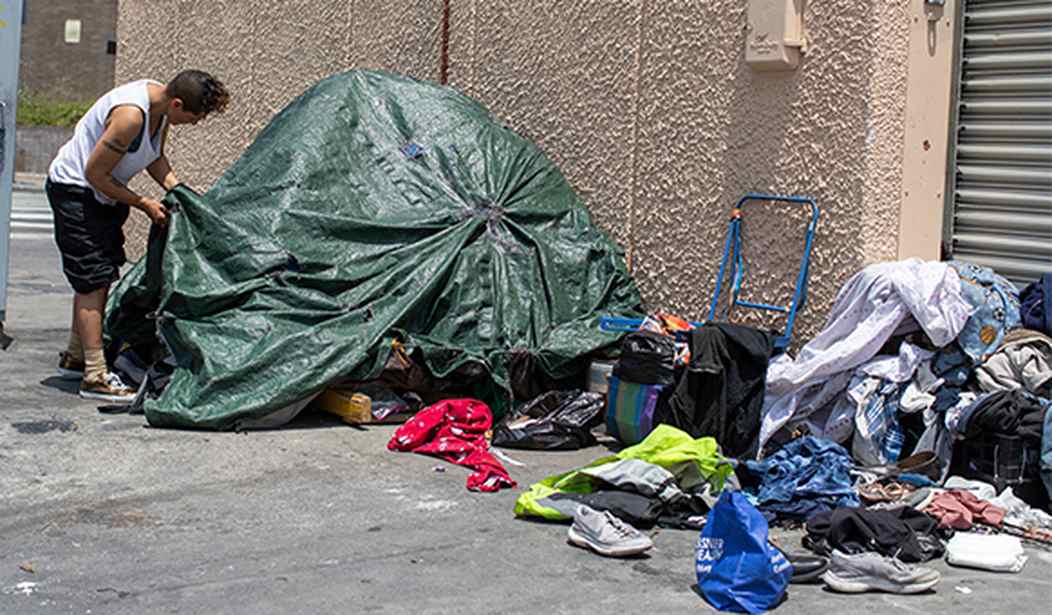There is little doubt that one of the biggest contributors to the decline of the quality of life in large American cities is the problem of homelessness. But for many years, the radical left refused to acknowledge that homelessness was something that couldn’t be fixed by throwing more and more money at the problem while making street people more comfortable.
Eliminating laws that made it illegal to urinate or defecate in public and making so-called “tent cities” possible has made urban places unbearable for the vast majority of residents. But now, the pandemic, as well as the opioid and fentanyl epidemics, has exposed those policies to be shortsighted and wrongheaded.
Also for our VIPs: West Coast, Messed Coast™ – Year 18 of the Big ‘Ten Year Plan to End Homelessness’
Almost sheepishly, left-wing mayors have done an about-face and are now cracking down on homelessness and homeless people.
Increasingly in liberal cities across the country — where people living in tents in public spaces have long been tolerated — leaders are removing encampments and pushing other strict measures to address homelessness that would have been unheard of a few years ago.
In Seattle, new Mayor Bruce Harrell ran on a platform that called for action on encampments, focusing on highly visible tent cities in his first few months in office. Across from City Hall, two blocks worth of tents and belongings were removed Wednesday. The clearing marked the end of a two and a half week standoff between the mayor and activists who occupied the camp, working in shifts to keep homeless people from being moved.
In Washington, D.C., Mayor Muriel Bowser launched a pilot program over the summer to permanently clear several homeless camps. In December, the initiative faced a critical test as lawmakers voted on a bill that would ban clearings until April. It failed 5-7.
After years of posturing and public preening about their homelessness policies, radical left mayors find themselves employing the same tactics used by big-city mayors in the past to control homelessness.
It’s not enough just to appropriate billions of dollars as California has done. There has to be recognition that the homeless themselves need to take some responsibility for their condition. This would have been unheard of a few years ago.
Some of the latest proposals had been suggested years ago, but they were seen as “attacking the victims.” But what happens with the “victims” start attacking everyone else?
San Francisco Mayor London Breed declared a state of emergency in December in the crime-heavy Tenderloin neighborhood, which has been ground zero for drug dealing, overdose deaths and homelessness. She said it’s time to get aggressive and “less tolerant of all the bull—- that has destroyed our city.”
In Sacramento voters may decide on multiple proposed homeless-related ballot measures in November — including prohibiting people from storing “hazardous waste,” such as needles and feces, on public and private property, and requiring the city to create thousands of shelter beds. City officials in the area are feeling increasing pressure to break liberal conventions, including from an conservation group that is demanding that 750 people camping along a 23-mile (37-kilometer) natural corridor of the American River Parkway be removed from the area.
Advocates for the homeless have denounced aggressive measures, saying the problem is being treated as a blight or a chance for cheap political gains, instead of a humanitarian crisis.
Even radical left mayors are politicians first. And when the voters complain about their safety, about their neighborhoods being turned into public toilets, and about homeless people who need hospitalization roaming the streets, the mayors listen. Their hearts may be with the homeless advocates, but practical politics has forced them to do what they should have been doing all along.
Not all of the homeless need to be institutionalized but many do, if only to ensure they take anti-psychotics and other life-changing medicines that could get many of them off the streets and back on the road to becoming productive citizens.
But homeless advocates see any coercive measures as oppression. Until that changes, it’s not likely that the homeless problem will be adequately addressed.










